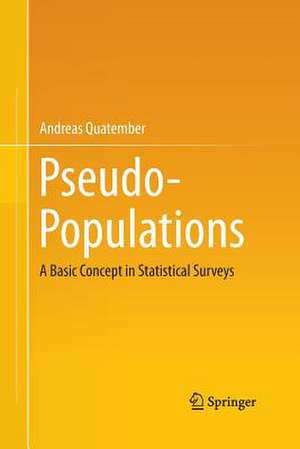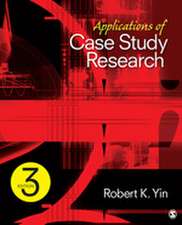Pseudo-Populations: A Basic Concept in Statistical Surveys
Autor Andreas Quatemberen Limba Engleză Paperback – 23 aug 2016
The chapters focus on estimation methods, sampling techniques, nonresponse, questioning designs and statistical disclosure control.
This book is a valuable reference in understanding the importance of the pseudo-population concept andapplying it in teaching and research.
| Toate formatele și edițiile | Preț | Express |
|---|---|---|
| Paperback (1) | 379.68 lei 6-8 săpt. | |
| Springer International Publishing – 23 aug 2016 | 379.68 lei 6-8 săpt. | |
| Hardback (1) | 386.99 lei 6-8 săpt. | |
| Springer International Publishing – 8 oct 2015 | 386.99 lei 6-8 săpt. |
Preț: 379.68 lei
Nou
Puncte Express: 570
Preț estimativ în valută:
72.65€ • 77.69$ • 60.58£
72.65€ • 77.69$ • 60.58£
Carte tipărită la comandă
Livrare economică 18 aprilie-02 mai
Preluare comenzi: 021 569.72.76
Specificații
ISBN-13: 9783319352800
ISBN-10: 3319352806
Pagini: 138
Ilustrații: X, 138 p.
Dimensiuni: 155 x 235 mm
Greutate: 0.22 kg
Ediția:Softcover reprint of the original 1st ed. 2015
Editura: Springer International Publishing
Colecția Springer
Locul publicării:Cham, Switzerland
ISBN-10: 3319352806
Pagini: 138
Ilustrații: X, 138 p.
Dimensiuni: 155 x 235 mm
Greutate: 0.22 kg
Ediția:Softcover reprint of the original 1st ed. 2015
Editura: Springer International Publishing
Colecția Springer
Locul publicării:Cham, Switzerland
Cuprins
Statistical Surveys.- The Pseudo-Population Concept .- Nonresponse and Untruthful Answering.- Simulation Studies in Survey Sampling.- The Bootstrap Method in Survey Sampling.- Generalized Randomized Response Questioning Designs.- A Unified Framework for Statistical Disclosure Control.- References.- Subject Index.
Recenzii
“This book attempts to present the theory of sample selection and estimation in the context of sampling from finite populations via a concept called ‘pseudo-populations’. … On the whole, this book is a welcome addition to the subject. … it will serve as a useful reference for graduate students specializing in survey sampling.” (Aloke Dey, Mathematical Reviews, May, 2016)
Notă biografică
Andreas Quatember is Associate Professor at the Department for Applied Statistics (IFAS) at the Johannes Kepler University JKU in Linz (Austria). He studied Statistics and wrote his doctoral thesis on "Quota Sampling". His main research topics are sampling theory and survey methodology. Currently, he is working on the project “Data quality in statistical surveys”.
Textul de pe ultima copertă
This book emphasizes that artificial or pseudo-populations play an important role in statistical surveys from finite universes in two manners: firstly, the concept of pseudo-populations may substantially improve users’ understanding of various aspects in the sampling theory and survey methodology; an example of this scenario is the Horvitz-Thompson estimator. Secondly, statistical procedures exist in which pseudo-populations actually have to be generated. An example of such a scenario can be found in simulation studies in the field of survey sampling, where close-to-reality pseudo-populations are generated from known sample and population data to form the basis for the simulation process.
The chapters focus on estimation methods, sampling techniques, nonresponse, questioning designs and statistical disclosure control.This book is a valuable reference in understanding the importance of the pseudo-population concept and applying it in teaching and research.
The chapters focus on estimation methods, sampling techniques, nonresponse, questioning designs and statistical disclosure control.This book is a valuable reference in understanding the importance of the pseudo-population concept and applying it in teaching and research.
Caracteristici
The book delivers an intuitive access to the basic ideas of sampling Develops theory for advanced methods based on this intuitive access Helps to combine (classical) full response sampling theory with the practice of nonresponse and untruthful answering














